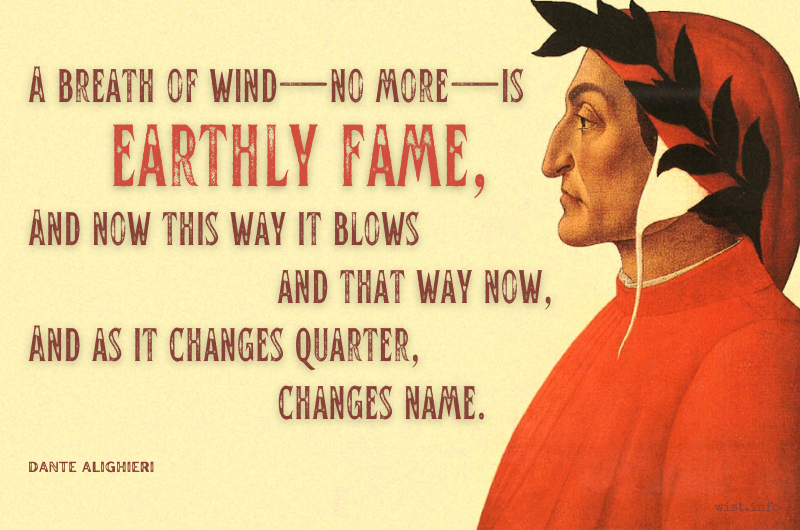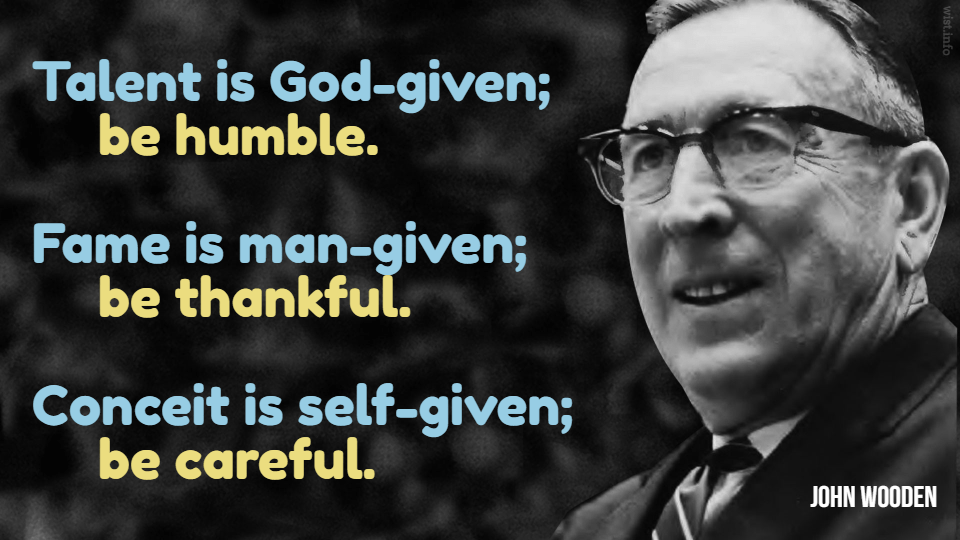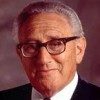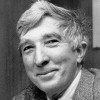One dreams of the goddess Fame and winds up with the bitch Publicity.
Peter De Vries (1910-1993) American editor, novelist, satirist
The Mackerel Plaza, ch. 12 (1958)
(Source)
Spoken by the narrator, Rev. Andrew Mackerel, quoting his deceased wife, Ida May.
Quotations about:
celebrity
Note not all quotations have been tagged, so Search may find additional quotes on this topic.
Life’s most painful condition: to be almost a celebrity.
Mignon McLaughlin (1913-1983) American journalist and author
The Neurotic’s Notebook, ch. 7 (1963)
(Source)
There are people who resemble popular songs: they are sung for a time and then forgotten.
[Il y a des gens qui ressemblent aux vaudevilles, qu’on ne chante qu’un certain temps.]
François VI, duc de La Rochefoucauld (1613-1680) French epigrammatist, memoirist, noble
Réflexions ou sentences et maximes morales [Reflections; or Sentences and Moral Maxims], ¶211 (1665-1678) [tr. FitzGibbon (1957)]
(Source)
The manuscripts of some early editions included a clause about those popular songs being distasteful (as seen in some of the translations below), but the phrase was not in the final (1678) edition:[Il y a des gens qui ressemblent aux vaudevilles, que tout le monde chante un certain temps, quelques fades et dégoûtants qu’ils soient.]
(Source (French)). Other translations:There are a sort of people may be compar'd to those trivial Songs, which all are in an humour to sing for a certain time, how flat and distasteful soever they may be.
[tr. Davies (1669), ¶64]Some Men are like Ballads, that every body Sings at one time or other, though they be never so dull and insipid.
[tr. Stanhope (1694), ¶212]There are people who, like new songs, are in vogue only for a time.
[pub. Donaldson (1783), ¶454; ed. Lepoittevin-Lacroix (1797), ¶202]There are those, who, like new songs, are favourites only for a time.
[ed. Carvill (1835), ¶491]Some people resemble ballads, which are only sung for a certain time.
[ed. Gowens (1851), ¶220]There are people who are like farces, which are praised but for a time (however foolish and distasteful they may be).
[tr. Bund/Friswell (1871), ¶211]Some people are like rag-time -- their popularity is short-lived.
[tr. Heard (1917), ¶216]Some people are like popular songs, which are sung only for a season.
[tr. Stevens (1939), ¶211]Some people are like a popular song, taken up only for a time.
[tr. Kronenberger (1959), ¶211]Some people are like popular songs that you only sing for a short time.
[tr. Tancock (1959), ¶211]There are people who resemble certain kinds of popular music, which are sung only for a certain time, however insipid and disgusting they may be, and then forgotten.
[tr. Whichello (2016) ¶211]
Were not this desire of fame very strong, the difficulty of obtaining it, and the danger of losing it when obtained, would be sufficient to deter a man from so vain a pursuit.
Joseph Addison (1672-1719) English essayist, poet, statesman
Essay (1711-12-22), The Spectator, No. 255
(Source)
If men of eminence are exposed to censure on one hand, they are as much liable to flattery on the other. If they receive reproaches which are not due to them, they likewise receive praises which they do not deserve. In a word, the man in a high post is never regarded with an indifferent eye, but always considered as a friend or an enemy.
Joseph Addison (1672-1719) English essayist, poet, statesman
Essay (1711-06-26), The Spectator, No. 101
(Source)
Of what value is fame, when one cannot enjoy posthumous fame?
[Was liegt am Ruhm, da man den Nachruhm nicht erleben kann?]
Marie von Ebner-Eschenbach (1830-1916) Austrian writer
Aphorisms [Aphorismen], No. 293 (1880) [tr. Wister (1883)]
(Source)
“Censure,” says a late ingenious author, “is the tax a man pays for being eminent.” It is a folly for an eminent man to think of escaping it, and a weakness to be affected with it. All the illustrious persons of antiquity, and indeed of every age in the world, have passed through this fiery persecution. There is no defense against reproach but obscurity; it is a kind of concomitant to greatness, as satires and invectives were an essential part of a Roman triumph.
Joseph Addison (1672-1719) English essayist, poet, statesman
Essay (1711-06-26), The Spectator, No. 101
(Source)
The quotation is from Jonathan Swift.
Censure is the tax a man pays to the public for being eminent.
Jonathan Swift (1667-1745) English writer and churchman
Essay (1706-10), “Thoughts on Various Subjects”
(Source)
The truth of it is, there is not a more unhappy being than a superannuated idol.
Joseph Addison (1672-1719) English essayist, poet, statesman
Essay (1711-05-24), The Spectator, No. 73
(Source)
The essay in focuses in particular on women who are idolized by coteries of men around them.
The love that a man gains by flattery, is worth just about az mutch az the flattery is.
[The love that a man gains by flattery is worth just about as much as the flattery is.]
Josh Billings (1818-1885) American humorist, aphorist [pseud. of Henry Wheeler Shaw]
Everybody’s Friend, Or; Josh Billing’s Encyclopedia and Proverbial Philosophy of Wit and Humor, ch. 156 “Affurisms: Embers on the Harth” (1874)
(Source)
Even the greatest actions of a celebrated person labour under this disadvantage, that, however surprising and extraordinary they may be, they are no more than what are expected from him; but, on the contrary, if they fall any thing below the opinion that is conceived of him, though they might raise the reputation of another, they are diminution to his.
Joseph Addison (1672-1719) English essayist, poet, statesman
Essay (1711-12-24), The Spectator, No. 256
(Source)
The events of the past month teach me to distrust Fame. I see that she does not finely discriminate, but coarsely hurrahs. She considers not the simple heroism of an action, but only as it is connected with its apparent consequences. She praises till she is hoarse the easy exploit of the Boston tea party, but will be comparatively silent about the braver and more disinterestedly heroic attack on the Boston Court-House, simply because it was unsuccessful!
Henry David Thoreau (1817-1862) American philosopher and writer
Speech (1854-07-04), “Slavery in Massachusetts,” Anti-Slavery Celebration, Framingham, Massachusetts
(Source)
The conviction in Boston of Anthony Burns, under the Fugitive Slave Act of 1850. led to large protests and an abolitionist riot at the Boston Courthouse, requiring Federal troops and state militia to ensure Burns' transport to a ship sailing to Virginia.
He that does a Memorable Action, and those that Report it, are all but short-liv’d Things.
[Πᾶν ἐφήμερον, καὶ τὸ μνημονεῦον καὶ τὸ μνημονευόμενον.]
Marcus Aurelius (AD 121-180) Roman emperor (161-180), Stoic philosopher
Meditations [To Himself; Τὰ εἰς ἑαυτόν], Book 4, ch. 35 (4.35) (AD 161-180) [tr. Collier (1701)]
(Source)
(Source (Greek)). Alternate translations:All things are transitory, and, as it were, but for a day; both those who remember; and the things, and persons remembered.
[tr. Hutcheson/Moor (1742)]Everything is only for a day, both that which remembers and that which is remembered.
[tr. Long (1862)]He that does a memorable action, and those that report it, are all but short-lived things.
[tr. Collier/Zimmern (1887)]Everything is but for a day, remembrancer alike and the remembered.
[tr. Rendall (1898)]All things are for a day, both what remembers and what is remembered.
[tr. Hutcheson/Chrystal (1902)]Ephemeral all of them, the rememberer as well as the remembered!
[tr. Haines (Loeb) (1916)]All is ephemeral, both what remembers and what is remembered.
[tr. Farquharson (1944)]All of us are creatures of a day; the rememberer and the remembered alike.
[tr. Staniforth (1964)]All is ephemeral, both that which remembers and that which is remembered.
[tr. Hard (1997 ed.)]Everything transitory -- the knower and the known.
[tr. Hays (2003)]All is ephemeral, both memory and the object of memory.
[tr. Hammond (2006)]They are all short-lived, both those who remember and the remembered.
[tr. Needleman/Piazza (2008)]All is ephemeral, both that which remembers and that which is remembered.
[tr. Hard (2011 ed.)]Everything is transitory, both that which remembers and that which is remembered.
[tr. Gill (2013)]
That integrity that lives only on opinion would starve without it; and that theatrical kind of virtue, which requires publicity for its stage, and an applauding world for an audience, could not be depended on in the secrecy of solitude, or the retirement of a desert.
Charles Caleb "C. C." Colton (1780-1832) English cleric, writer, aphorist
Lacon: Or, Many Things in Few Words, Vol. 1, § 236 (1820)
(Source)
Esteem is worth more than celebrity, respect is worth more than renown, and honor is worth more than fame.
[L’estime vaut mieux que la célébrité, la considération vaut mieux que la renommée, et l’honneur vaut mieux que la gloire.]
Nicolas Chamfort (1741-1794) French writer, epigrammist (b. Nicolas-Sébastien Roch)
Products of Perfected Civilization [Produits de la Civilisation Perfectionée], Part 1 “Maxims and Thoughts [Maximes et Pensées],” ch. 2, ¶ 131 (1795) [tr. Merwin (1969)]
(Source)
(Source (French)). Alternate translations:Esteem is better than celebrity, respect is better than renown, and honour than glory.
[tr. Mathers (1926)]Esteem is worth more than being celebrated, respect is better than renown, and honour is better than fame.
[tr. Pearson (1973)]Esteem is worth more than celebrity, consideration is worth more than fame, and honor is worth more than glory.
[tr. Siniscalchi (1994)]
It’s not so easy to go on to the balcony unless of course that’s what you want. As it turned out, that isn’t what I want. The great terror of public speaking is that you begin to listen to yourself. By and by, since you are always telling people what to think, you begin to forget what you do to think. And the moment that happens, of course, it’s over. It’s over.
James Baldwin (1924-1987) American novelist, playwright, activist
Interview (1965-07), “Race, Hate, Sex, and Colour: A Conversation,” with Colin MacInnes and James Mossman, Encounter, BBC Two TV
(Source)
On fame and the increased calls for him to speak and lecture rather than write.
Transcribed in Vol. 25, issue 1 of Encounter magazine (1965-07). I cannot narrow down if it was the episode on 8 or 22 July. (Some sources suggest the 18 February episode; the July date may just come from the magazine version.)
Without favour none will know you, and with it you will not know your selfe.
George Herbert (1593-1633) Welsh priest, orator, poet.
Jacula Prudentum, or Outlandish Proverbs, Sentences, &c. (compiler), # 159 (1640 ed.)
(Source)
A celebrity is one who is known to many persons he is glad he doesn’t know.
H. L. Mencken (1880-1956) American writer and journalist [Henry Lewis Mencken]
A Little Book in C Major, ch. 5, § 5 (1916)
(Source)
Variants:CELEBRITY. One who is known to many persons he is glad he doesn't know.
[A Book of Burlesques, "The Jazz Webster" (1924)]A celebrity is one who is known to many persons he is glad he doesn’t know.
[Chrestomathy, ch. 30 "Sententiae" (1949)]
What is the end of Fame? ’tis but to fill
A certain portion of uncertain paper:
Some liken it to climbing up a hill,
Whose summit, like all hills, is lost in vapour;
For this men write, speak, preach, and heroes kill,
And bards burn what they call their “midnight taper,”
To have, when the original is dust,
A name, a wretched picture, and worse bust.
Popularity is the easiest thing in the world to gain and it is the hardest thing to hold.
I have known nearly all the famous men of our age and I have seen them made wretched by this glorious passion for fame, and die after debauching their moral natures in its service.
[J’ai connu presque tous les hommes célèbres de notre tems, et que je les ai vus malheureux par cette belle passion de célébrité, et mourir, après avoir dégradé par elle leur caractère moral.]Nicolas Chamfort (1741-1794) French writer, epigrammist (b. Nicolas-Sébastien Roch)
Products of Perfected Civilization [Produits de la Civilisation Perfectionée], Part 1 “Maxims and Thoughts [Maximes et Pensées],” “Question” (1795) [tr. Merwin (1969)]
(Source)
(Source (French)). Alternate translation:I have known nearly every famous man in our times, and I have seen them unhappy through this pretty passion for celebrity, and die after having degraded their moral character for it.
[tr. Siniscalchi (1994)]
A breath of wind — no more — is earthly fame,
And now this way it blows and that way now,
And as it changes quarter, changes name.
[Non è il mondan romore altro ch’un fiato
di vento, ch’or vien quinci e or vien quindi,
e muta nome perché muta lato.]Dante Alighieri (1265-1321) Italian poet
The Divine Comedy [Divina Commedia], Book 2 “Purgatorio,” Canto 11, l. 100ff (11.100-102) [Oderisi of Gubbio] (1314) [tr. Sayers (1955)]
(Source)
(Source (Italian)). Alternate translations:The breath of Fame is but a fickle gale,
Whose veering blasts from every point prevail,
And every change bestows a different name.
[tr. Boyd (1802), st. 20]The noise
Of worldly fame is but a blast of wind,
That blows from divers points, and shifts its name
Shifting the point it blows from.
[tr. Cary (1814)]The mundane rumour is a fleeting breath
Of wind, that veers and varies in account,
And changes name because it changes point.
[tr. Bannerman (1850)]Naught is this mundane rumour but a breath
Of wind, that comes now this way and now that,
And changes name, because it changes side.
[tr. Longfellow (1867)]The rumour of the world is naught else than a breath of wind, which now comes hence and now comes thence, and changes name because it changes quarter.
[tr. Butler (1885)]Mundane renown is but a breath forlorn
Of wind that cometh now from here, now there,
Named various from the quarter whence 'tis borne.
[tr. Minchin (1885)]Worldly renown is naught but a breath of wind, which now comes this way and now comes that, and changes name because it changes quarter.
[tr. Norton (1892)]Earthly fame is naught but a breath of wind, which now cometh hence and now thence, and changes name because it changes direction.
[tr. Okey (1901)]The world's noise is but a breath of wind which comes now this way and now that and changes name because it changes quarter.
[tr. Sinclair (1939)]Naught but a wind's breath is the world's acclaim,
Which blows now hence, now thence, as it may hap,
And when it changes quarter changes name.
[tr. Binyon (1943)]A breath of wind is all there is to fame
here upon earth: it blows this way and that
and when it changes quarter it changes name.
[tr. Ciardi (1961)]Earthly fame is naught but a breath of wind,
which now comes hence and now comes thence,
changing its name because it changes quarter.
[tr. Singleton (1973)]Your earthly fame is but a gust of wind
that blows about, shifting this way and that,
and as it changes quarter, changes name.
[tr. Musa (1981)]Earthly fame is nothing but a breath of wind,
Which first blows one way and then blows another,
And brings a fresh name from each fresh direction.
[tr. Sisson (1981)]Worldly renown is nothing other than
a breath of wind that blows now here, now there,
and changes name when it has changed its course.
[tr. Mandelbaum (1982)]The clamor of the world is nothing but a breath of wind that comes now from here and now from there, and changes names because it changes directions.
[tr. Durling (2003)]Worldly Fame is nothing but a breath of wind, that now blows here, and now there, and changes name as it changes direction.
[tr. Kline (2002)]The roar of earthly fame is just a breath
of wind, blowing from here and then from there,
that changes name in changing origin.
[tr. Kirkpatrick (2007)]Worldly fame is nothing but a gust of wind,
first blowing from one quarter, then another,
changing name with every new direction.
[tr. Hollander/Hollander (2007)]Shouts of worldly fame are nothing more
Than a passing breath of wind, blowing here,
Then there, changing its name from place to place.
[tr. Raffel (2010)]
Celebrity: the advantage of being known by those who do not know you.
[Célébrité: l’avantage d’être connu de ceux qui ne vous connaissent pas.]
Nicolas Chamfort (1741-1794) French writer, epigrammist (b. Nicolas-Sébastien Roch)
Products of Perfected Civilization [Produits de la Civilisation Perfectionée], Part 1 “Maxims and Thoughts [Maximes et Pensées],” ch. 2, ¶ 135 (1795) [tr. Mathers (1926)]
(Source)
(Source (French)). Alternate translations:Celebrity: the advantage of being known to those who do not know you.
[tr. Hutchinson (1902)]Celebrity: the advantage of being known by those who do not know you.
[tr. Merwin (1969)]Being a celebrity gives you the advantage of being known to those not of your acquaintance.
[tr. Pearson (1973)]Celebrity: the advantage of being known by those who do not know you.
[tr. Dusinberre (1992)]Celebrity: the advantage of being known by people who don't know you.
[tr. Parmée (2003), ¶ 111]Celebrity: the advantage of being recognized by people who don't know you.
[Siniscalchi (1994)]
I don’t think about whether people will remember me or not. I’ve been an okay person. I’ve learned a lot. I’ve taught people a thing or two. That’s what’s important. Sooner or later the public will forget you, the memory of you will fade. What’s important are the individuals you’ve influenced along the way.
A transition from an author’s book to his conversation is too often like an entrance into a large city after a distant prospect. Remotely, we see nothing but spires of temples, and turrets of palaces, and imagine it the residence of splendor, grandeur, and magnificence; but when we have passed the gates, we find it perplexed with narrow passages, disgraced with despicable cottages, embarrassed with obstructions, and clouded with smoke.
Samuel Johnson (1709-1784) English writer, lexicographer, critic
The Rambler, #14 (5 May 1784)
(Source)
Once you’ve been to Cambodia, you’ll never stop wanting to beat Henry Kissinger to death with your bare hands. You will never again be able to open a newspaper and read about that treacherous, prevaricating, murderous scumbag sitting down for a nice chat with Charlie Rose or attending attending some black-tie affair for a new glossy magazine without choking. Witness what Henry did in Cambodia — the fruits of his genius for statesmanship — and you will never understand why he’s not sitting in the dock at The Hague next to Milošević. While Henry continues to nibble nori rolls and remaki at A-list parties, Cambodia, the neutral nation he secretly and illegally bombed, invaded, undermined, and then threw to the dogs, is still trying raise itself up on its one remaining leg.
Anthony Bourdain (1956-2018) American chef, author, travel documentarian
A Cook’s Tour, ch. 9 “Road to Pailin” (2001)
(Source)
The professional celebrity, male and female, is the crowning result of the star system of a society that makes a fetish of competition.
C. Wright Mills (1916-1962) American sociologist, academic, author [Charles Wright Mills]
The Power Elite (1956)
(Source)
Celebrity is just obscurity biding its time.
Talent is God-given; be humble. Fame is man-given; be thankful. Conceit is self-given; be careful.
A democracy is badly served when newspapers and television focus so intensely on the personal joys and tragedies of famous people. This kind of “news” crowds out more serious issues, and there is an important difference — as the Constitution’s framers well knew, and as many people today appear to have forgotten — between the public interest and what interests the public.
Glorious men are the scorn of wise men, the admiration of fools, the idols of parasites, and the slaves of their own vaunts.
Francis Bacon (1561-1626) English philosopher, scientist, author, statesman
“Of Vain-Glory,” Essays, No. 54 (1625)
(Source)
How many sacrifice honor, a necessity, to glory, a luxury?
Joseph Roux (1834-1886) French Catholic priest
Meditations of a Parish Priest: Thoughts, ch. 4, #38 (1886)
(Source)
Many men and many women enjoy popular esteem, not because they are known, but because they are not.
Nicolas Chamfort (1741-1794) French writer, epigrammist (b. Nicolas-Sébastien Roch)
(Attributed)
(Source)
Attributed in Maturin M. Ballou, Notable Thoughts About Women, #3144 (1882). I have been unable to find an analog in various translations of Chamfort's Products of a Perfected Civilization or in any other primary source.
The political leaders with whom we are familiar generally aspire to be superstars rather than heroes. The distinction is crucial. Superstars strive for approbation; heroes walk alone. Superstars crave consensus; heroes define themselves by the judgment of a future they see it as their task to bring about. Superstars seek success in a technique for eliciting support; heroes pursue success as the outgrowth of their inner values.
The best fame is a writer’s fame. It’s enough to get a table at a good restaurant, but not enough that you get interrupted when you eat.
Fran Lebowitz (b. 1950) American journalist, essayist
Panel Discussion (1993-05-24), “Fame in the 20th Century,” Clive James (moderator), Joseph Papp Public Theater, New York City
(Source)
Reported in William Grimes, "The New Fame, or, How a Nobody Can Be Somebody," New York Times (1993-05-26).
The prestige you acquire by being able to tell your friends that you know famous men proves only that you are yourself of small account.
W. Somerset Maugham (1874-1965) English novelist and playwright [William Somerset Maugham]
The Summing Up, ch. 2 (1938)
(Source)
A transition from an author’s book to his conversation, is too often like an entrance into a large city, after a distant prospect. Remotely, we see nothing but spires of temples and turrets of palaces, and imagine it the residence of splendour, grandeur and magnificence; but when we have passed the gates, we find it perplexed with narrow passages, disgraced with despicable cottages, embarrassed with obstructions, and clouded with smoke.
Samuel Johnson (1709-1784) English writer, lexicographer, critic
The Rambler, #14 (5 May 1750)
(Source)
Celebrity is a mask that eats into the face. As soon as one is aware of being “somebody,” to be watched and listened to with extra interest, input ceases, and the performer goes blind and deaf in his overanimation. One can either see or be seen.
Popularity is a Crime from the Moment it is sought; it is only a Virtue where Men have it whether they will or no.
George Savile, Marquis of Halifax (1633-1695) English politician and essayist
“Of Ambition,” Political, Moral, and Miscellaneous Reflections (1750)
(Source)
HARRIS: You know, you’re really nobody in L.A. unless you live in a house with a really big door.
Steve Martin (b. 1945) American comedian, actor, writer, producer, musician
L. A. Story (1991)
(Source)
Those whom the gods wish to destroy, they first make famous.
Joyce Carol Oates (b. 1938) American author
“Down the Road,” New Yorker (27 Mar 1985)
See Euripides.
You long to “leap at a single bound into celebrity.” Nothing is so common-place as to wish to be remarkable. Fame usually comes to those who are thinking about something else, — very rarely to those who say to themselves, “Go to, now, let us be a celebrated individual!”
Certainly fame is like a river, that beareth up things light and swollen, and drowns things weighty and solid.
Francis Bacon (1561-1626) English philosopher, scientist, author, statesman
“Of Praise,” Essays, No. 53 (1625)
(Source)
Those very philosophers even in the books which they write about despising glory, put their own names on the title-page. In the very act of recording their contempt for renown and notoriety, they desire to have their own names known and talked of.
[Ipsi illi philosophi etiam illis libellis, quos de contemnenda gloria scribunt, nomen suum inscribunt; in eo ipso in quo praedicationem nobilitatemque despiciunt, praedicari de se, ac nominari volunt.]
Marcus Tullius Cicero (106-43 BC) Roman orator, statesman, philosopher
Pro Archia Poeta [For Archia the Poet], ch. 11 / sec. 26 (62 BC) [tr. Yonge (1856)]
(Source)
(Source (Latin)). Other translations:For celebrated philosophers themselves inscribed their name even on the lampoons which they wrote on contempt of fame; in that very thing in which they despise publicity and nobility, they wish themselves to be made public and to merit a name.
[tr. M'Donogh Mahony (1886)]Even those very philosophers who write treatises on the despising of fame, put their names on the title-page; in the very place in which they deprecate self-advertisement and notoriety they take steps to have themselves advertised and made notorious.
[ed. Harbottle (1897)]Those philosophers themselves, even in those pamphlets which they write concerning despising glory, will inscribe their names: in this (case) itself, in which they despise commendation and renown they wish to be commended concerning themselves, and (that) themselves to (should) be named.
[tr. Dewey (1916)]Why, upon the very books in which they bid us scorn ambition philosophers inscribe their names! They seek advertisement and publicity for themselves on the very page whereon they pour contempt upon advertisement and publicity.
[tr. Watts (Loeb) (1923)]Those great philosophers themselves, in the very books which they compose on the subject of despising glory, write their own names upon the title-pages; and in the very thing wherein they look down on public praise and a name of renown, they claim to be publicly praised and named.
[tr. Allcroft/Plaistowe (c. 1925)]The very philosophers themselves, even in those books which they write on contempt of glory, inscribe their names; in that very work in which they profess scorn for notice and reputation, they wish to be advertised and celebrated.
[tr. Guinach (1962)]The philosophers who write treatises "on despising glory" actually inscribe their own names on those very books! In the actual writings in which they scorn publicity and fame they want to be publicized and named!
[tr. Berry (2000)]
FAMOUS, adj. Conspicuously miserable.
Ambrose Bierce (1842-1914?) American writer and journalist
“Famous,” The Cynic’s Word Book (1906)
(Source)
Included in The Devil's Dictionary (1911). Originally published in the "Devil's Dictionary" column in the San Francisco Wasp (1884-06-28).
When most the world applauds you, most beware;
‘Tis often less a blessing than a snare.Edward Young (1683-1765) English poet
Poem (1727), “The Universal Passion: Satire 6,” Love of Fame, the Universal Passion (1728)
(Source)
It is dangerous to let the public behind the scenes. They are easily disillusioned and then they are angry with you, for it was the illusion they loved.
W. Somerset Maugham (1874-1965) English novelist and playwright [William Somerset Maugham]
The Summing Up, ch. 23 (1938)
(Source)
But a new danger appears in the excess of influence of the great man. His attractions warp us from our place. We have become underlings and intellectual suicides. Ah! yonder in the horizon is our help; — other great men, new qualities, counterweights and checks on each other. We cloy of the honey of each peculiar greatness. Every hero becomes a bore at last.
Ralph Waldo Emerson (1803-1882) American essayist, lecturer, poet
“Uses of Great Men,” Representative Men Lecture 1, Boston (1845-12-11)
(Source)
It is a great piece of folly to sacrifice the inner for the outer man, to give the whole or the greater part of one’s quiet, leisure, and independence for splendor, rank, pomp, titles and honor.
[Es ist eine große Thorheit, um nach Außen zu gewinnen, nach Innen zu verlieren, d. h. für Glanz, Rang, Prunk, Titel und Ehre, seine Ruhe, Muße und Unabhängingkeit ganz oder großen Theils hinzurgeben.]
Arthur Schopenhauer (1788-1860) German philosopher
Parerga and Paralipomena, Vol. 1, “Aphorisms on the Wisdom of Life [Aphorismen zur Lebensweisheit],” ch. 2 “Personality, or What Man Is [Von dem, was einer ist]” (1851) [tr. Saunders (1890)]
(Source)
(Source (German)). Alternate translation:It is a great folly to lose the inner man in order to gain the outer, that is, to give up the whole or the greater part of one's quiet, leisure, and independence for splendor, rank, pomp, titles and honors.
[tr. Payne (1974)]
Celebrity-worship and hero-worship should not be confused. Yet we confuse them every day, and by doing so we come dangerously close to depriving ourselves of all real models. We lose sight of the men and women who do not simply seem great because they are famous but are famous because they are great. We come closer and closer to degrading all fame into notoriety.













































